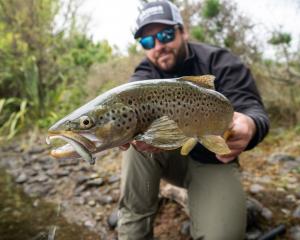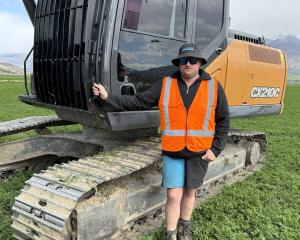
An inquest into Paul William Wilson's death on February 2 was heard before Otago-Southland coroner David Crerar in Alexandra yesterday. The inquest was adjourned to November 30 to hear evidence from the pathologist.
Yesterday's proceedings included evidence from 12 witnesses, recordings of two phone calls to emergency services and recordings of radio conversations between police and others involved in the search. In their evidence, Mr Wilson's parents, Jeff and Sue Wilson, strongly criticised the police response to the emergency.
Otago Regional Council compliance manager Peter Kelliher, of Dunedin, confirmed the council had received numerous complaints and queries about whether the Talla Burn power scheme was meeting its resource consent conditions.
The scheme, on the Talla Burn at Beaumont Station, is owned by the Hore and Wilson families and has been generating power for a year.
There was no condition imposed by the regional council for regular water-sampling, Mr Kelliher said.
James Wilson said he and his brother both worked on the power scheme. The project initially attracted mixed responses from local residents, he said.
‘‘But then people had gone from being either for or against us to being vehemently against us.''
One person kept objecting about sediment in the river and Paul was taking samples to prove a point that the scheme was not responsible for that.
On February 2, his father said he was concerned Paul had not come back from what he said would be a 15-minute trip to the power station to take water samples. James and a friend carried out a quick search along the river and continued searching once the helicopters arrived. The Otago Regional Rescue Helicopter, a Beaumont Station machine and one piloted by Doug Maxwell all searched.
James broke down as he described the discovery of one of Paul's waders in the river.
"I think we knew then that Paul had gone into the river and lost his wader.''
It was important for the water sample to be accurate - taken from in the flow - and he believed his brother had got the sample and then slipped into the flooded river ‘‘and come to grief''.
‘‘I can't rule out the fact he might have crossed the swollen river - he was a bit random in his decision-making at times.''
Jeff Wilson gave evidence of becoming concerned after his son failed to return with water samples. It was almost three hours before he contacted emergency services but his son often got ‘‘sidetracked'' so he was not alarmed straight away.
He made several calls before he phoned police, trying to contact the Hore family, who had a helicopter, and walking around looking for his son.
He was angry police communications staff had no idea where the Millennium Track or Talla Burn were and thought they were not acting quickly enough.
If he had waited too long to contact police, ‘‘that's something I have to live with''.
Mrs Wilson was angry the Millennium Track was not on any maps, which added to the confusion once emergency services were contacted.
There seemed to be a delay in any official response to the distress call.
The items belonging to Paul - his wader, camera and cellphone - were found by the private searchers and private helicopters, not the police dive squad or searchers, she said.
Mr Crerar pointed out the first 111 call was made at 2.54pm that day and the rescue helicopter, contacted by police, was in the air by 3.08pm.
The official search took several days and included aerial, ground and river searches. Mr Wilson's body was found in the Clutha River, about 5km from the power station, a week later.
The Department of Labour carried out an investigation into Mr Wilson's death and decided he made the decision himself to take the water samples.
A spokesman said the department would not be laying any charges against the power scheme company, Mr Wilson's employer.












